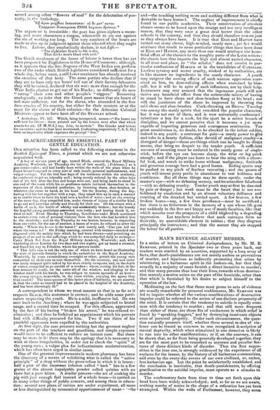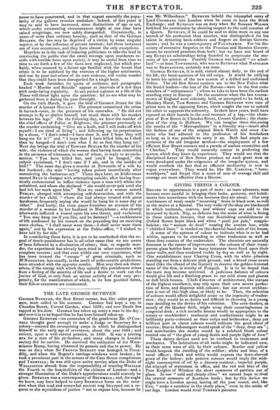MAN'S REVENGE AGAINST MURDER.
IN a series of letters on Criminal Jurisprudence, by Mr. M. B. Sampson, printed in the Spectator two or three years back, our readers were startled by an assertion, supported by a long array of facts, that death-punishments are not merely useless as preventives of murder, and injurious as indirectly promoting that crime by ministering to a barbarous spirit in the lookers-on, but that they actually in a majority of cases furnish a direct incentive to murder; and that many persons thus lose their lives, towards whose destruc- tion scarcely emotive exists on the part of the homicide, other than that which is furnished by his desire to subject himself to the operation of the law.
Meditating on the fact that those most prone to acts of violence are usually remarkable for personal recklessness, Mr. SAMPSON was led to inquire whether all the various manifestations of destructive impulse could be referred to the action of one distinct propensity of the mind. It is certain that the tendency to suicide is equally com- mon with the tendency to murder ; and that still more frequent than either of these, are those fits of excitement in which relief is found by "speaking daggers," and by destroying inanimate objects even of personal property. Under such circumstances, the ques- tion naturally presents itself, whether these several modes of vio- lence can be traced as common to one recognized description of mental depravity, which when stimulated in one direction is likely to run into its other manifestations; or if, on the contrary, it can be shown that, so far from being generally developed together, they are for the most part to be remarked as separate and peculiar fea- tures of three distinct kinds of disorder. That the first suppo- sition is the true one, is strongly evidenced by the experience of all asylums for the insane, by the history of all barbarous communities, and even by the every-day events of our own civilized, or, rather, less barbarous age. Let the point be satisfactorily established, and the conclusion is inevitable, that death-punishments, by offering gratification to the suicidal impulse, must operate as a stimulus to murder.
The confirmatory facts from time to time set forth upon this head have been widely acknowledged; and, so far as we are aware, nothing worthy of notice in the shape of a refutation has yet been attempted. Within the walls of Parliament, however, they seem
never to have penetrated, and in that august assembly the popu- larity of the gallows remains unshaken : indeed, of late years it may be said to have increased, since distinctions of age or sex, which under extenuating circumstances might at one time have raised misgivings, are now safely disregarded. Occasionally, in cases of more than ordinary ferocity, such as that of the German STOLZER, the law may be deprived of a victim by some singular caprice, or by the influence of private interest ; but these instances are of rare occurrence, and they form almost the only exceptions.
Hopeless as is the task of inducing politicians to take the lead in convincing the public that the sweet revenge upon murderers re- coils with terrible force upon society, it may be useful from time to time to set forth a few of the facts now neglected, but which pro- bably, when scanned by a future age familiar with the lesson that crime is to be subdued by the exercise of the higher sentiments, and not by poor imitations of its own violence, will excite wonder that they could have been disregarded for a single hour. Each week furnishes its quota of evidence, and paragraphs headed "Murder and Suicide" appear at intervals of a few days with undeviating regularity. At any period a glance at a file of the Times will throw light upon the question : let us see what may be gathered from it during the past fortnight.
On the 14th March, it gave the trial of GEORGE JUBEE for the murder of Adjutant MACKAY. The prisoner committed the crime in barrack-room, in the presence of his comrades. "He did not attempt to fly or shelter himself, but stood there with his musket between his legs." On the following day, we have the murder of the chief officer of Police at Brighton ; the prisoner previously to the murder exclaiming, "Give me a knife, and I will make off with myself—I am tired of living"; and following up its perpetration by a shout, "I don't mind—I have done it, and I hope they will hang me for it!" and " 1 hope that I have killed him, as I shall then be hanged—I don't care what I do so that they hang me." Next day brings the trial of EDWARD BUTLER for the murder of his wife; the violence of which the woman died having been committed in the presence of witnesses, to one of whom, in reply to an excla- mation, " You have killed her, and you'll be hanged," the culprit exclaimed, " I don't care if' I am, and in the middle of hell ! " The same day gives a murder at Newcastle of a with by her husband ; the man "having taken poison immediately after committing the barbarous act." Three days later, an Irishwoman named RYAN is charged with attempting suicide, after having fran- tically eudeavoured to inflict violence upon a man with whom she cohabited, and whom she declared "she would never quit until she had left her mark upon him." Next we read of a woman named Fulmar, charged with attempting self-destruction, and with the murder of her child, " whom she had always treated with great harshness, frequently saying she would be hung for it some day or other." And lastly, the same paper furnishes an account of the murder of a woman by her husband in Marylebone ; who shortly afterwards inflicted a wound upon his own throat, and exclaimed, "You may hang me if you like, and be damned ! "—a recklessness of life confirmed by his remark on the preceding day on receiving some clothes, " I shall never want them—I shall never wear them again," and by his expression at the Police-office, "I wished to have laid by her side."
In considering these facts, it is not to be overlooked that the re- peal of death-punishment has in all other cases that we are aware of been followed by a diminution of crime; that, as regards mur- der, the experiment has already been tried in other countries with complete success; and that even within our own experience, what has been termed the " escape " of great criminals, such as M‘NAUGHTEN, has usually, in the teeth of unfavourable predictions, been attended with the opposite results. Men may then ask them- selves, if the energy with which they uphold this punishment arises from a feeling of the sanctity of life and a desire to work out the justice of God, or only from an undue activity of that very pro- pensity, for the manifestation of which, in its less guarded forms, their fellow-creatures are condemned.



























 Previous page
Previous page